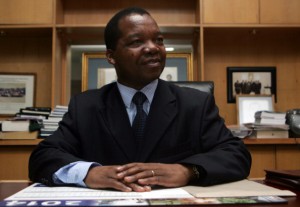Source: SA should have pressured Zim to use rand: Mangudya – NewsDay Zimbabwe September 30, 2017
RESERVE Bank of Zimbabwe governor John Mangudya yesterday said South Africa had let Zimbabwe down in 2008 when it facilitated a political settlement, but did not deal with economic changes which were at the core of the crisis back then.
by PAIDAMOYO MUZULU
Speaking to civil society organisations led by the Crisis in Zimbabwe Coalition at a meeting to discuss the current liquidity challenges, Mangudya said the country should have gone the rand route in 2009.
“Thabo Mbeki and Jacob Zuma were mediators to the Global Political Agreement (GPA). They should have given us economic support and up to now the proposed R1 billion support is still to materialise,” he said in response to a question on why the country was not adopting the rand.
Mangudya said South Africa then was in a position to bring about the economic change because of the strategic and influential role it played during the GPA talks.
“We witnessed the expansion of government in 2009 instead of tackling economic reforms. We should have found an economic solution, say, of R5 billion loans. They had leverage on us, but we were deceived by the US dollar that was weak then due to the world economic recession,” he said.
The central bank chief further stated there was resistance now to change and as long as Zimbabwe did not have a loan from South Africa the solution lay in increased exports.
Crisis in Zimbabwe Coalition director Pamela Kadhau had earlier told Mangudya that civil society and human rights defenders were worried about the abuse of pensioners, who were now literally camped at banks waiting to access their cash.
“The bank and the State should be concerned about the welfare of its citizens particularly the elderly and pensioners who are struggling to access their monies in the banks,” Kadhau said.
“As part of the solution, we have developed a document, Zimsmart, that has alternative policy solutions to the problems we are facing. We hope the central bank will consider our suggestions.”

COMMENTS